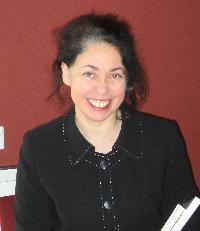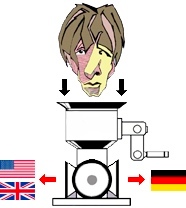| Pages in topic: [1 2] > | Poll: Would you say you are a specialist, or a generalist? Thread poster: ProZ.com Staff
|
|---|
This forum topic is for the discussion of the poll question "Would you say you are a specialist, or a generalist?".
View the poll results »
| | | |
I started out translating some 40 years ago as a generalist but pretty quickly realized that there are certain types of text I’m not qualified to handle or that I simply don’t enjoy. Today my main area of work is EU affairs, but over the years I have gained experience in several other fields. I still consider myself a generalist, though I’ve occasionally been told I'm a specialist I always take these comments with a pinch of salt. My degree is in economics but as there were no student-work... See more I started out translating some 40 years ago as a generalist but pretty quickly realized that there are certain types of text I’m not qualified to handle or that I simply don’t enjoy. Today my main area of work is EU affairs, but over the years I have gained experience in several other fields. I still consider myself a generalist, though I’ve occasionally been told I'm a specialist I always take these comments with a pinch of salt. My degree is in economics but as there were no student-workers by then, it took me so long to obtain it that I almost never used it formally. I do translate economics but not finance (hate it) and my areas of specialization have very little to do with economics. One of the things I love about translation is that one learns something new (almost) every day… ▲ Collapse
| | | | Kay Denney 
France
Local time: 14:28
French to English
I'm a specialist, although my speciality can encompass almost anything since I specialise in texts with a creative element.
This rules out finance, legal and technical translation - it's easier for me to state the subjects I don't work in than those I do.
The specialist subjects I'm most interested in are the arts. I work for several different artists and musicians, as well as record labels, museums and art galleries (museums mostly via agencies).
But one... See more I'm a specialist, although my speciality can encompass almost anything since I specialise in texts with a creative element.
This rules out finance, legal and technical translation - it's easier for me to state the subjects I don't work in than those I do.
The specialist subjects I'm most interested in are the arts. I work for several different artists and musicians, as well as record labels, museums and art galleries (museums mostly via agencies).
But one of the things I love about my job is the variety, so if I'm asked to do other stuff and I'm available, I'll enjoy doing that too. I've done lots of stuff in fashion and textiles, cosmetics, TV, cinema, travel, the environment, sustainable development and gastronomy, just to name a few pretty vast subjects.
Working in only one language pair is another form of specialising too. I know that I pick up on all sorts of references and allusions in the texts I translate, and I pick up on them precisely because of my pretty thorough knowledge of French culture in general, having lived here and taken a very close interest in French language, literature, art and music all my adult life. I'm not sure that it's possible to maintain such intimate knowledge of more than one country's culture unless you can live in each one for extended periods, and a nomadic lifestyle can be complicated when you start acquiring kids and pets. Maybe you can nowadays with so much stuff online, but it wasn't possible when I first started out as a translator. ▲ Collapse
| | | |
Generalist, definitely
If I were translating very complex texts, I'd have to raise my rates. A lot.
The thing is, the minute you have to conduct research, the time needed to translate a text properly begins to increase, even doubling or tripling.
And, in my experience, few clients are willing to pay double or triple for a HARD translation relative to an EASY translation
And that's a big dilemma
| | |
|
|
|
Tom in London
United Kingdom
Local time: 13:28
Member (2008)
Italian to English
My specialist areas are architecture-construction-real estate-cities and urbanism-industrial design-restoration- histories and theories of architecture and cities-buildings and their components/materials - etc. etc. Anything to do with all of that. Any translator who specialises in something will know that their specialisation can encompass a very wide field.
But I also find myself called upon to translate documents on other subjects: Power of Attorney and other legal documents; the... See more My specialist areas are architecture-construction-real estate-cities and urbanism-industrial design-restoration- histories and theories of architecture and cities-buildings and their components/materials - etc. etc. Anything to do with all of that. Any translator who specialises in something will know that their specialisation can encompass a very wide field.
But I also find myself called upon to translate documents on other subjects: Power of Attorney and other legal documents; the assembly instructions for model ships and racing cars; machinery for large-scale printing factories; agricultural machines; etc.
So I am both a specialist, and a generalist.
But there are certain types of documents I cannot and will not translate: anything medical, for example. ▲ Collapse
| | | | Alex Lichanow
Germany
Local time: 14:28
Member (2020)
English to German
+ ...
While I do have three "main" specializations (IT, automotive, video games), those specializations alone require technical, legal and marketing translation skills; not to mention video games from a vast array of different genres, of which I only exclude MOBAs, most first-person shooters as well as any casino/gambling shovelware for a lack of interest and knowledge.
I am also more than willing to work outside of those specializations as long as the content is not too heavy on things I don't ... See more While I do have three "main" specializations (IT, automotive, video games), those specializations alone require technical, legal and marketing translation skills; not to mention video games from a vast array of different genres, of which I only exclude MOBAs, most first-person shooters as well as any casino/gambling shovelware for a lack of interest and knowledge.
I am also more than willing to work outside of those specializations as long as the content is not too heavy on things I don't know much about.
[Edited at 2023-02-03 10:09 GMT] ▲ Collapse
| | | | Lieven Malaise
Belgium
Local time: 14:28
Member (2020)
French to Dutch
+ ...
If you build experience during almost 23 years in almost every possible field, then you are a specialist. It is simple as that.
I know people will disagree, but in all those years I have edited too much translations from so-called specialists that I could have done better in some cases, and way better in even more cases, to think otherwise.
Specializations are very relative. We are putting together words, not car parts, and the name of every single car part and the expl... See more If you build experience during almost 23 years in almost every possible field, then you are a specialist. It is simple as that.
I know people will disagree, but in all those years I have edited too much translations from so-called specialists that I could have done better in some cases, and way better in even more cases, to think otherwise.
Specializations are very relative. We are putting together words, not car parts, and the name of every single car part and the explanation of virtually every engineering system (feel free to add medicine specialist terminology, legal jargon, etcetera etcetera) can be found on the internet. All it takes is experience, knowing where to look, knowing which sources to trust and which you can't, and that experience is built by just doing it and taking your losses (if any) during the learning process. ▲ Collapse
| | | | Jan Truper 
Germany
Local time: 14:28
Member (2016)
English to German
| specialized generalist | Feb 3, 2023 |
I am a generalist specializing in dialogue translation for various entertainment formats (subtitles, games).
| | |
|
|
|
| I have to totally disagree with this point of view | Feb 3, 2023 |
Lieven Malaise wrote:
If you build experience during almost 23 years in almost every possible field, then you are a specialist. It is simple as that.
I know people will disagree, but in all those years I have edited too much translations from so-called specialists that I could have done better in some cases, and way better in even more cases, to think otherwise.
Specializations are very relative. We are putting together words, not car parts, and the name of every single car part and the explanation of virtually every engineering system (feel free to add medicine specialist terminology, legal jargon, etcetera etcetera) can be found on the internet. All it takes is experience, knowing where to look, knowing which sources to trust and which you can't, and that experience is built by just doing it and taking your losses (if any) during the learning process.
"Specializations are very relative" OMG.
So you translate Legal, Medical, Aeronautics and Quantum Physics... and you're a specialist! Ok.
That's WHY, Agencies will pay peanuts since "a lot of translators" think (in general terms) like this. One-for-all, no matter what, since you can have plenty of dictionaires at hand. And can make a quick search to "confirm" "what you found on internet" (internet adding more chaos to someone who has no idea what the text is talking about, in first place). Internet can confirm anything, since there are millions of pages. Whatever.
This is an irresponsable point of view, in my opinion. It is OK if you translate simple texts for a general public, general ideas blablabla. But when you're addressing the document to specialized public (Lab staff, Regulatory Agencies, Engineers, etc.) they will quickly see translation was not done by someone competent. I used to laugh while unpacking & reading the (translated) instructions for a new lab equipment or reagents... and everyday I try to avoid people laughing (or worse, getting frustrated or mad) in hospitals, labs, etc. Because that "little detail" can in fact, be very important.
[Editado a las 2023-02-03 11:04 GMT]
[Editado a las 2023-02-03 11:12 GMT]
[Editado a las 2023-02-03 14:21 GMT]
| | | | Lieven Malaise
Belgium
Local time: 14:28
Member (2020)
French to Dutch
+ ...
Justin Peterson wrote:
Generalist, definitely
If I were translating very complex texts, I'd have to raise my rates. A lot.
The thing is, the minute you have to conduct research, the time needed to translate a text properly begins to increase, even doubling or tripling.
This seems to be a special take on translation  . So you are basically saying that you hardly do any research? Good for you (really), but I'm really wondering what kind of texts you are actually translating. I honestly can't immediately think of texts that don't need research to be translated properly. I translate a variety of things like manuals, clinical studies, government policy documents, contracts, technical specifications, court documents, annual financial reports, company brochures, marketing brochures, product descriptions, you name it. But they all need research, and sometimes a lot. . So you are basically saying that you hardly do any research? Good for you (really), but I'm really wondering what kind of texts you are actually translating. I honestly can't immediately think of texts that don't need research to be translated properly. I translate a variety of things like manuals, clinical studies, government policy documents, contracts, technical specifications, court documents, annual financial reports, company brochures, marketing brochures, product descriptions, you name it. But they all need research, and sometimes a lot.
| | | | Lieven Malaise
Belgium
Local time: 14:28
Member (2020)
French to Dutch
+ ...
| Let's keep it friendly | Feb 3, 2023 |
abe(L)solano wrote:
That's WHY, Agencies will pay peanuts since "a lot of translators" think like you. One-for-all, no matter what,
since you have plenty of dictionaires at hand. And can make a quick search to "confirm" "what you found on internet" (internet adding more chaos to someone who has no idea what the text is talking about, in first place). Internet can confirm anything, since there are millions of pages. Whatever.
Internet search is a skill, and when in doubt, those doubts are shared with the (end) client, which in turn clarifies those doubts. It's a good system.
abe(L)solano wrote:
I am NOT originally a linguist/translator.
In my 23-year experience people who are not originally a linguist aren't too good in translation (I've seen too many 'specialized' engineers with a lack of understanding of the source and an obvious general lack of linguistic skills). So if I would be as judgmental as you are, I could say you are probably one of them. You see what I did there? Let's keep it friendly.
abe(L)solano wrote:
Of course someone can translate w/o being MD, Engineer, etc. but you must learn some basics FIRST, or read specialized sources, not trust glossaries found randomly.
Well, you don't. That's kind of my whole point that I'm proving until today. And the only one talking about 'randomly' is you.
abe(L)solano wrote:
Quite an irresponsable point of view, in my opinion. It is OK if you translate simple texts for a general public, general ideas blablabla. But when you're addressing the document to specialized public (Lab staff, Regulatory Agencies, Engineers, etc.) they will quickly see translation was not done by someone competent. I used to laugh while unpacking & reading the (translated) instructions for a new lab equipment or reagents... and everyday I try to avoid people laughing (or worse, getting frustrated or mad) in hospitals, labs, etc. Because that "little detail" can in fact, be very important.
Bad translators are indeed a problem. I'm not one of them.
| | | | | Yes, from what you say/your approach, Lieven Malaise | Feb 3, 2023 |
I believe it is much more rigorous, and I believe this is cultural and/or derived from your personal trajectory.
But unfortunately, from what I see on a daily basis and some Pow-Wows where people frankly and openly say that they can deal with "any" text thanks to their dictionaries and what they found on the internet (at random),
I don't think this is a right and PROFESSIONAL attitude - if you pass from legal one day, Oil industry the next one, and mechanics the third. You jus... See more I believe it is much more rigorous, and I believe this is cultural and/or derived from your personal trajectory.
But unfortunately, from what I see on a daily basis and some Pow-Wows where people frankly and openly say that they can deal with "any" text thanks to their dictionaries and what they found on the internet (at random),
I don't think this is a right and PROFESSIONAL attitude - if you pass from legal one day, Oil industry the next one, and mechanics the third. You just can't keep track.
And agree with you, not anyone with a PHD on Astrophysics can translate as well as he/she does research.
I reckon that GOOD translators have other capabilities than myself. But the GOOD translators know their limits and resources too, and they do have this rigorous approach you talk about, on your post/comment to Justin Peterson: Lot of research is needed sometimes (if the material is specialized) - and not everyone even think to do a small research. Because of time, but also because they are too overconfident or that the editor/proofreader will come and "clean after"...
[Editado a las 2023-02-03 11:27 GMT]
[Editado a las 2023-02-03 11:32 GMT] ▲ Collapse
| | |
|
|
|
Justin Peterson wrote:
If I were translating very complex texts, I'd have to raise my rates. A lot.
The thing is, the minute you have to conduct research, the time needed to translate a text properly begins to increase, even doubling or tripling.
And, in my experience, few clients are willing to pay double or triple for a HARD translation relative to an EASY translation
And that's a big dilemma
But to a specialist, your hard translation is an easy translation and requires no research.
I suspect that the only genuinely hard translations out there are ones where the source text is genuinely unintelligible, like where Chinglish or MT is used as a bridging language, and literary stuff.
| | | | Samuel Murray 
Netherlands
Local time: 14:28
Member (2006)
English to Afrikaans
+ ...
| A generalist working in specialist fields | Feb 3, 2023 |
I'm a generalist but most of my work is in one specialist field.
| | | |
Lieven Malaise wrote: abe(L)solano wrote:
That's WHY, Agencies will pay peanuts since "a lot of translators" think like you. One-for-all, no matter what,
since you have plenty of dictionaires at hand. And can make a quick search to "confirm" "what you found on internet" (internet adding more chaos to someone who has no idea what the text is talking about, in first place). Internet can confirm anything, since there are millions of pages. Whatever. Internet search is a skill, and when in doubt, those doubts are shared with the (end) client, which in turn clarifies those doubts. It's a good system. abe(L)solano wrote:
I am NOT originally a linguist/translator. In my 23-year experience people who are not originally a linguist aren't too good in translation (I've seen too many 'specialized' engineers with a lack of understanding of the source and an obvious general lack of linguistic skills). So if I would be as judgmental as you are, I could say you are probably one of them. You see what I did there? Let's keep it friendly. abe(L)solano wrote:
Of course someone can translate w/o being MD, Engineer, etc. but you must learn some basics FIRST, or read specialized sources, not trust glossaries found randomly. Well, you don't. That's kind of my whole point that I'm proving until today. And the only one talking about 'randomly' is you. abe(L)solano wrote:
Quite an irresponsable point of view, in my opinion. It is OK if you translate simple texts for a general public, general ideas blablabla. But when you're addressing the document to specialized public (Lab staff, Regulatory Agencies, Engineers, etc.) they will quickly see translation was not done by someone competent. I used to laugh while unpacking & reading the (translated) instructions for a new lab equipment or reagents... and everyday I try to avoid people laughing (or worse, getting frustrated or mad) in hospitals, labs, etc. Because that "little detail" can in fact, be very important. Bad translators are indeed a problem. I'm not one of them.
The translators with no linguistic training are, more often than not, part of the problem of the translation market, but, ironically, often think very highly of themselves and consider themselves supreme linguists without ever qualifying as linguists in the first place. Translator and linguist aren't synonyms, after all, but one must be a good linguist in order to be a great translator!
Only in translation is this sort of ignorance and arrogance possible and accepted. If any of us actual linguists would start advertising we are engineers, medical doctors, bankers...etc. For obvious reasons everyone, even the faux linguists, would understand that's ridiculous.
You will often see on this forum, newcomers being told that the lack of linguistic training and a diploma in a totally unrelated field is a huge plus. You will also, more often than certainly I'd expect on this or at any translation forum, find an utter lack of understanding of basic linguistics, linguistic rules, psycholinguists, and how language works.
To be perfectly blunt, I always wonder how bad one had to be at their profession in the first place to switch to translation? Why would anyone leave a field they are successful in to start over as a translator? There's a number of people who perhaps retire from their first career, and/or are disillusioned with the culture of their first career, but still! Only in translation can a person with zero formal linguistic training consider themselves a better linguist than the actual linguists. Not that I don't know plenty of actual linguists who are still bad translators, in my pairs at least, but they're so despite their linguistic training, not because of it. Just like the non-linguists who really are good translators, are that despite their lack of training, certainly not because of it!
I've started weightlifting in October. I was an obsessive runner in my 20s, a dedicated hiker in my 30s, went to the gym to work with very light weights periodically, but this is the first time I lift. I can actually deadlift 70 kg that's 154lbs right now, but to get there I needed a trainer. They have the same problem. Anyone is calling themselves a fitness trainer. My trainer studied sport and fitness for four years, at the same gym there are women who took a three-month course in fitness selling classes online. I feel in many ways we share this problem, the fitness and translation fields, that is. Anyone who calls themselves a translator simply now is one, and then they will confuse that with being a linguist and that's how you get all these people who think 'well, I cannot do the things you can, you must be lying and falsely advertising your services'.
Now the non-linguists often say, well, linguistics isn't brain surgery, but that's exactly my point. That one can perform a brain surgery does not necessarily make them a good medical translator. It often requires even very different types of cerebral skills and fortes to be a linguist vs an engineer, for example, etc.
Let me just say that I don't mind any competition, I am very confident in everything I do sell as my services, because I am so very good at it, that's why I advertise it, but I do often chuckle. I can tell a lot about the quality of a translator just by the way they talk about language and the finer linguistic points of translation.
Lastly, the honest truth is, and to use medicine as an example, most translations aren't 'super confidential and super important medical, life or death deciding behemoths of an assignment' ordeals and when they are, the people we work with on the client's side understand we are translators and not MDs or biochemists and guide us carefully through the kinds of pitfalls only a professional in the source text fields would know about. Same for other complex fields.
So yes, my dear Lieven, I completely understand your point of view, unfortunately not many people on this forum will and the ones that do will keep quite afraid of *ahem* the bullies.
Edit: Rewriting is the mother of all texts worth reading. I try not to change the gist and meaning, just the style.
[Edited at 2023-02-03 14:03 GMT]
| | | | | Pages in topic: [1 2] > | To report site rules violations or get help, contact a site moderator: You can also contact site staff by submitting a support request » Poll: Would you say you are a specialist, or a generalist? | Protemos translation business management system | Create your account in minutes, and start working! 3-month trial for agencies, and free for freelancers!
The system lets you keep client/vendor database, with contacts and rates, manage projects and assign jobs to vendors, issue invoices, track payments, store and manage project files, generate business reports on turnover profit per client/manager etc.
More info » |
| | Anycount & Translation Office 3000 | Translation Office 3000
Translation Office 3000 is an advanced accounting tool for freelance translators and small agencies. TO3000 easily and seamlessly integrates with the business life of professional freelance translators.
More info » |
|
| | | | X Sign in to your ProZ.com account... | | | | | |































